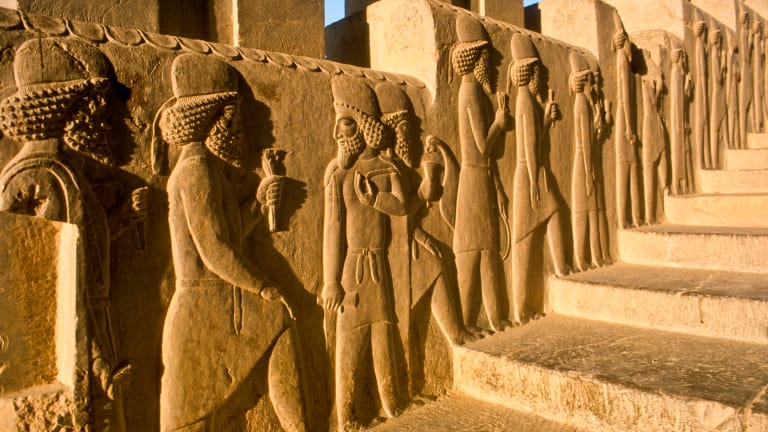On Kings and Kingdoms
- By Jon Hagen
- •
- 01 Nov, 2020
Only One Leader is Worthy of Your Trust

If anyone should have long-term historical memory, it’s Christians who read their Bible. Especially the Old Testament. It might be that your world is afire right now, but we’ve seen this before. Baptized in Hebrew Scripture, we don’t go down into the mirage of thinking our current moment in history is the most important. Nor do we take to heart or participate in the constant tapping of the panic button by news outlets and social media. Like looking up at a star-filled night sky, reading Biblical history gives perspective to one’s place and time on earth. Therefore, we should get neither too amped nor anxious nor angry about the next historical tick on God’s eternal clock.
Consider the books of 1st and 2nd Kings. In 1 Kings 12, the foolishness (see my previous post from Oct 2020) of King Rehoboam created a schism within Israel. Once divided, we read about Judah in the south and Israel in the north. The author’s arrangement of recording their respective histories is instructive. The method seems to be one of searching: Is there a form of governing this world that works supremely? Is there a leader fit to supremely rule? There must be inquiry into this, but how?
Alec Motyer states that the author of the books of Kings “does this by allowing his spotlight to swing backwards and forwards: south and north, north and south. In the south there was the monarchy of David, reigning on the Lord’s throne, with son following father in ordered succession, for five centuries. It was very different in the north. There men rose to kingship by their own abilities and ambitions, and dynasty succeeded dynasty as each in turn failed and another came to power. Monarchy was ordered in the south; in the north it was charismatic. The two stood in essential contrast but both ran into the sand. The swinging spotlight failed to find the true king either in a monarchy underwritten by divine covenant or in the natural abilities of very gifted men” (Look to the Rock: An Old Testament Background to our Understanding of Christ, p. 29).
God is letting us know that one national leader after another fall short of His standard and should not be an object of our trust. If leaders don’t fail religiously, then they will fail politically. And if not politically, then they fail morally. “It is better to take refuge in the Lord than to trust in princes” (Psalm 118:9). “Put not your trust in princes, in a son of man, in whom there is no salvation. When his breath departs, he returns to the earth; on that very day his plans perish” (Psalm 146:3-4).
As if to make God’s case air tight, much of the Old Testament’s history looks outside Israel and onto the world stage. And what do we find? The same phenomena in every other nation. I’ve been picking my way through the book of Isaiah for more than a month now, and it gets head-spinning to watch as leaders, cities, and nations come and go. For time’s sake, take a look at just the kings of Persia. The call and casting by God feature an astounding array of events and personalities that run like a red carpet through the desert.
Cyrus the Great is the first Persian king. Well attested by ancient historians such as Herodotus and Xenophon, no one, including his enemies, has a bad thing to say about Cyrus. The people in powerful nations like Babylon believed they would be treated sympathetically by Cyrus, and would simply surrender as Cyrus and his army approached. Such was Cyrus’s reputation. The Jews experienced much grace from Cyrus as he is the one who gave the order to rebuild the Temple at Jerusalem (Ezra 1:2), to restore the vessels that Nebuchadnezzar had carried away (1:7), and for cedar trees to be shipped down from Lebanon (3:7).
If that behavior is not surprising, as it should be, then what would you think if God Himself refers to Cyrus in messiah-like terms? A little more than two hundred years before Cyrus comes on the stage, Isaiah prophesies that God would raise up a leader and give him the name Cyrus. Yahweh would use Cyrus to deliver and restore the Hebrews from their Babylonian captivity. This is God using human agency to accomplish His sovereign will. You can read all about it in Isaiah 45.
We could go on with other Persian kings like Darius, who you would likely know as the ruler over Daniel and the lion’s den. Or king Xerxes, who you would likely know more popularly as the king who attacked the Greek king Leonidas’s three hundred Spartans at the Hot Gates of Thermopylae. Xerxes is the same king referred to in the book of Esther as Ahasuerus. And in that context, Xerxes is viewed very favorably. And yet Xerxes is known to have referred to himself as the king of kings. Quite a claim given that the totality of the Persian empire lasted only a little more than two hundred years. Leaders come, and leaders go.
Where am I going with all of this? Let me use an analogy. When my boys were learning to drive, I told them over and over that the vast majority of accidents occur at intersections. Slowing down, not speeding up, is how to navigate the crossroads. With that in mind, the Christian life is lived at the intersection of heaven and earth in which we are citizens of both places. One is the City of Man which is temporal and in constant flux, and the other is the City of God which is eternal and cannot be shaken.
This intersection is a tricky place to traverse, so we should travel slow and light. The Bible is repeatedly clear that we should not go through it without regard for our fellow travelers. Neither should we go through it without regard for God who rules it all. While you might be one who thinks and talks and acts like you have a corner on the truth in the City of Man, it’s the height of arrogance to think, talk, and act toward others like you know what the Sovereign One is up to in the City of God.
As Isaiah goes on to say, God’s thoughts and ways are not only not like ours, they are above and beyond ours (Is. 55:9). If the leader you prefer ascends, you cannot get triumphant since that leader is sure to disappoint and soon to pass off the stage. And if the leader you prefer does not ascend, you cannot despair since God has sovereignly allowed or ordained it. As I’ve tried to illustrate using the historical record, God is known for using whoever He chooses—even your enemies—to accomplish His grander, redemptive purposes.
Will we make the same mistake as ancient Israel? “This is what the Sovereign Lord, the Holy One of Israel, says: ‘Only in returning to me and resting in me will you be saved. In quietness and confidence is your strength. But you would have none of it” (Is. 30:15).
Because there is only one leader and ruler worthy of your trust and devotion, and his name is Jesus.








